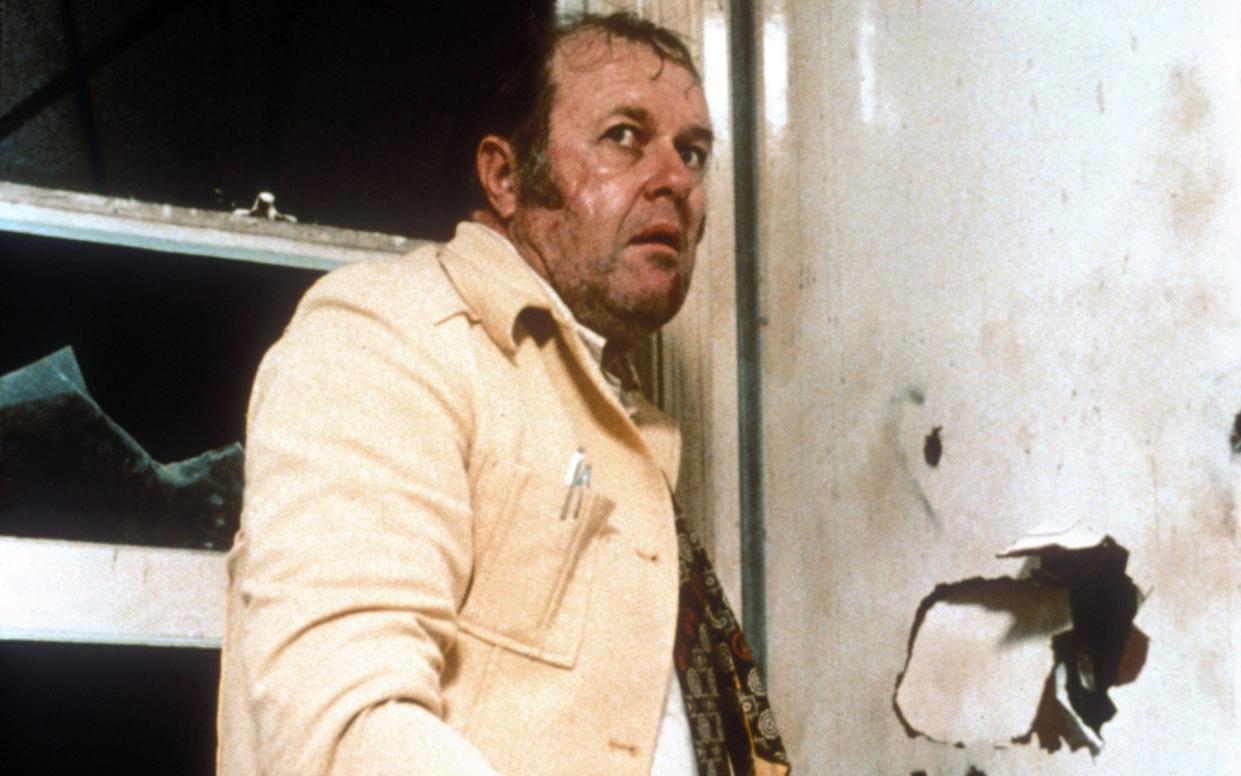M Emmet Walsh, actor best known for his grizzled roles in Blade Runner and Blood Simple – obituary

M Emmet Walsh, who has died aged 88, was a steadfast character actor adored among cinephiles for the notes of scuffed-up life he gifted American film over his six-decade career, most memorably in Ridley Scott’s Blade Runner (1982) and the Coen brothers’ Blood Simple (1984).
Heavy-set and amenable to dishevelment, with flyaway hair, a squint and a quavering voice, he could perhaps have only broken through amid the New Hollywood of the 1970s, geared as the movement was to unvarnished explorations of the human condition. Dubbing Walsh “the poet of sleaze”, Roger Ebert linked the actor with Harry Dean Stanton – a forlorn beanpole to Walsh’s burly scrapper – in what he called “the Stanton-Walsh rule”, decreeing that “no movie featuring either Harry Dean Stanton or M Emmet Walsh in a supporting role can be entirely bad”.
Walsh was nearing middle age when he broke through, initially playing blue-collar types. Yet extended scrutiny revealed a glint in his eye that invited interpretation as either mischievous, murderous or both simultaneously. He was the oddball sportswriter Dickie Dunn in Paul Newman’s ice hockey comedy Slap Shot (1977); Dustin Hoffman’s scuzzball parole officer in Straight Time (1978), a character described by the critic Mike Clark as “a cesspool in a flowered shirt”; and the sniper pursuing Steve Martin with such taunts as “Die, milkface!” in The Jerk (1979).
In Blade Runner (1982), he was Bryant, the LAPD chief who pulls Harrison Ford’s replicant hunter Rick Deckard out of retirement, although the film’s grander designs left the actor bemused. Required to smoke through multiple takes, non-smoker Walsh began feeling nauseous, eventually telling Ridley Scott: “you ought to be hung by your balls off the ceiling and twisted from left to right.” The producer Alan Ladd Jr overheard, and promptly dropped Walsh from another film he was preparing.
A more rewarding experience followed with Blood Simple (1984), the low-budget neo-noir that announced the Coens as emergent prodigies. As private eye Visser, poking through the weeds of a marital murder plot, Walsh demonstrated a layered seediness; the force of the film’s blackly potent punchline was largely down to the chuckle in his gurgling voice. As Pauline Kael observed: “Walsh lays on the loathsomeness, but he gives it a little twirl – a sportiness.”
It landed Walsh the Best Male Lead gong at 1986’s Independent Spirit Awards, but he continued to regard himself as chiefly a team player: “My job is to come in and move the story along. I’m a character man. The stars don’t do the exposition… so I come on with a Redford or Newman or Dustin or somebody, and I throw the ball to them, and they throw it back.”

Michael Emmet Walsh was born on March 22 1935 in Ogdensburg, New York, the son of a customs agent, Henry Walsh, and Agnes, née Sullivan. The family moved to Vermont shortly thereafter, where the three-year-old Walsh lost the hearing in his left ear following a botched mastoid operation. He attended Tilton School in New Hampshire and studied marketing at New York’s Clarkson University, where he also appeared in stage productions.
A faculty adviser urged Walsh to apply for the American Academy of Dramatic Arts, where his assigned roommate was William Devane. Upon graduating, he spent a decade working in regional theatre, making his TV debut on the NBC soap The Doctors in 1968, and taking his Broadway bow alongside Al Pacino in the 1969 premiere of Don Petersen’s Does a Tiger Wear a Necktie?
He felt his prospects in theatre were limited, due to his thick Vermont accent (“I wasn’t going to do Shaw and Shakespeare and Molière – my speech was simply too bad”), although he made a belated, one-off comeback in the National Theatre’s 2004 revival of Sam Shepard’s Buried Child. Variety noted: “the veteran of 101 movies and counting turns out to be a no less astonishing theatre animal.”
Mostly, he dug in at the movies, reuniting with the Coens for Raising Arizona (1987), where he played Nicolas Cage’s loudmouth co-worker, billed in the credits as “Machine Shop Ear-Bender”. He took a rare upstanding role as Michael Keaton’s sponsor in the alcoholism drama Clean and Sober (1988), then found himself fighting back-to-back with Dolph Lundgren in Red Scorpion (1988). It was the Walsh career in a nutshell: you never knew where he would turn up, nor what he would be doing there.
In the 1990s, he was a millionaire’s goon in the indie fable The Music of Chance (1993), Tim Allen’s father-in-law in Home Improvement (1994), the Apothecary in Baz Luhrmann’s Romeo + Juliet (1996), and a fleeting but significant presence in The X-Files (1999), advising conspiracy nut Fox Mulder to “start paying a little less attention to the heart of the mystery and a little more attention to the mystery of the heart”. There was also an appearance in the summer dud Wild Wild West (1999), which even Ebert admitted contravened the Stanton-Walsh rule.
More recently, Walsh was seen – greyer and shaggier of brow – on TV in Sneaky Pete (2019) and The Righteous Gemstones (2019-22), and on the big screen as the security guard Mr Proofroc in Knives Out (2019). His final appearance was in Mario van Peebles’s Western sequel Outlaw Posse (2024).
He lived alone in rural Vermont, insisting: “I’m content without having to get on the Johnny Carson show every other night [to] say how wonderful I am. I’m a low-profile guy.” It was, finally, the characters who got him out of bed: “I approach each job thinking it might be my last, so it better be the best work possible. I want to be remembered as a working actor. I’m being paid for what I’d do for nothing.”
M Emmet Walsh, born March 22 1935, died March 19 2024
